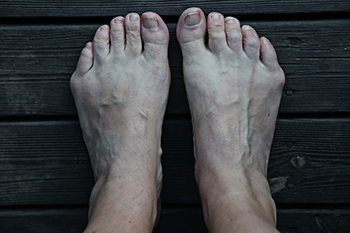What Is a Tailor’s Bunion?
Tuesday, 19 October 2021 00:00 A tailor’s bunion, also known as a bunionette, occurs when the 5th metatarsal bone (the bottom bone on the little toe) begins to shift outwards. Tailor’s bunions are very similar to a normal bunion which occurs on the big toe, but instead, they occur on the pinky toe. A tailor’s bunion will present itself as a swollen bump on the outside of the pinky toe, and it may get larger over time. They can be red and painful, and they tend to get worse as they rub against the shoe. Some of the reasons Tailor’s bunions may form include shoes that don’t fit correctly, an inherited structural foot problem, loose ligaments in the foot, or an inverted foot that leans outwards. Patients who are struggling with a painful Tailor’s bunion should consult with a podiatrist for suggestions on both relieving the pain and treating the bunion.
A tailor’s bunion, also known as a bunionette, occurs when the 5th metatarsal bone (the bottom bone on the little toe) begins to shift outwards. Tailor’s bunions are very similar to a normal bunion which occurs on the big toe, but instead, they occur on the pinky toe. A tailor’s bunion will present itself as a swollen bump on the outside of the pinky toe, and it may get larger over time. They can be red and painful, and they tend to get worse as they rub against the shoe. Some of the reasons Tailor’s bunions may form include shoes that don’t fit correctly, an inherited structural foot problem, loose ligaments in the foot, or an inverted foot that leans outwards. Patients who are struggling with a painful Tailor’s bunion should consult with a podiatrist for suggestions on both relieving the pain and treating the bunion.
If you are suffering from bunions, contact one of our podiatrists of Bazzi Podiatry. Our doctors can provide the care you need to keep you pain-free and on your feet.
What Is a Bunion?
A bunion is formed of swollen tissue or an enlargement of boney growth, usually located at the base joint of the toe that connects to the foot. The swelling occurs due to the bones in the big toe shifting inward, which impacts the other toes of the foot. This causes the area around the base of the big toe to become inflamed and painful.
Why Do Bunions Form?
Genetics – Susceptibility to bunions are often hereditary
Stress on the feet – Poorly fitted and uncomfortable footwear that places stress on feet, such as heels, can worsen existing bunions
How Are Bunions Diagnosed?
Doctors often perform two tests – blood tests and x-rays – when trying to diagnose bunions, especially in the early stages of development. Blood tests help determine if the foot pain is being caused by something else, such as arthritis, while x-rays provide a clear picture of your bone structure to your doctor.
How Are Bunions Treated?
- Refrain from wearing heels or similar shoes that cause discomfort
- Select wider shoes that can provide more comfort and reduce pain
- Anti-inflammatory and pain management drugs
- Orthotics or foot inserts
- Surgery
If you have any questions, please feel free to contact one of our offices located in Detroit, West Detroit, Northwest Detroit, Sterling Heights, Hamtramck, Dearborn Heights, Madison Heights, Redford, and Livonia, MI . We offer the newest diagnostic and treatment technologies for all your foot care needs.




